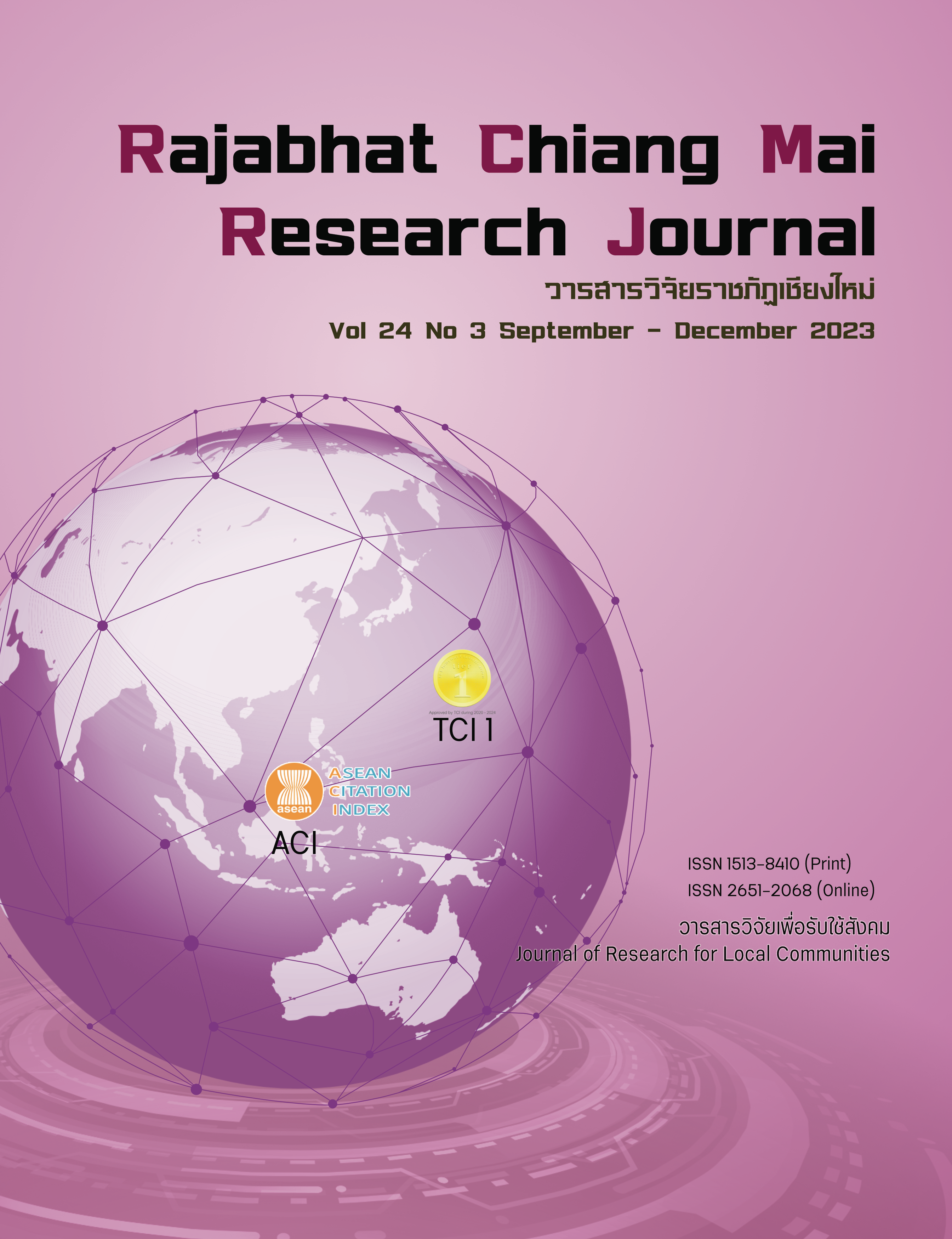Development of School Management Model to Promote Thinking Process Skills of Watjamarom School under the Roi Et Primary Educational Service Area Office 2
DOI:
https://doi.org/10.57260/rcmrj.2023.264065Keywords:
Development, School management model, Promote thinking process skillsAbstract
This research aims to; 1) to study the components of the school management model to promote thinking process skills of Watjamarom School under the Roi Et Primary Educational Service Area Office 2, 2) to study the current condition, the desirable condition, and the need for developing a school management model to promote thinking process skills of Watjamarom School, 3) to develop a school management model to promote thinking process skills of Watjamarom School, and 4) to study the results of using the school management model to promote thinking process skills of Watjamarom School, employing the four-phase research, Phase 1: Analysis of the components of the resultant system by seven experts, Phase 2: research present situations, ideal conditions, and development needs model for managing schools to encourage thinking process skills, data was collected using a questionnaire. 5-level estimation scale, the sample group used as administrators, teachers, and educational personnel, basic education institute committee chairman, parents, and community leaders, totaling 138 people, data analysis by means, standard deviation, Phase 3: creation of a school management model to encourage thinking process skills. This phase involves researching schools with management systems that encourage thinking process skills and best practices, and Phase 4: by implementing the established model in schools.
The findings of the study may be summed up as follows:
1. There are 6 components of the school management model to promote thinking process skills of Watjamarom School: 1) policies to promote thinking process skills, 2) executive leadership, 3) curriculum to promote thinking process skills, 4) teacher personality and teaching and learning management to promote thinking process skills, 5) student characteristics that promote thinking process skills, and 6) an environment that fosters thinking process skills, where peer-reviewed results were found to be the most appropriate.
2. Watjamarom School,conducted a study on the school management model to promote thinking process skills, and the findings revealed that the overall desirable condition is at a high level.
3. Watjamarom School management approach to thinking process skills together with; 1) management and policy implementation to promote thinking process skills into practice, 2) curriculum development that promotes thinking process skills, 3) learning management to promote thinking process skills, 4) the provision of an environment and a learning center that promotes thinking process skills, and 5) the aspect of developing student characteristics that promote thinking process skills. The model was evaluated by specialists, and the findings showed that it was appropriate overall at the highest level.
4.. The results of applying the model revealed that; 1) overall, the management component and the implementation of policies to advance the application of thinking process skills were at the highest level, 2) the element of curriculum development that best fosters thinking process skills was present generally, 3) the evaluation outcomes for learning management to support thinking process skills were at the highest level overall, 4) the assessment's findings on creating a space and a learning environment that encourages the use of all thinking process skills were at the highest level, and 5) students' development of traits that support thinking process skills were at good and very good levels, which represented 88.31% of the total.
Downloads
References
Dewey, J. (1973). How to Think. New York: D.C. Health and Company.
Guilford, J. P. (1967). The Nature of Human Intelligence. New York: McGraw-Hill Book Company.
Khaemani, T. (2001). The Science of Thinking. The Master Group Management Co., Ltd. (In Thai)
Ministry of Education. (2008). Basic Education Core Curriculum 2008. Bangkok: Ministry of Education. (In Thai)
Moonkham, S. (2011). Organization of learning activities that emphasize thinking. Bangkok: EK Books. (In Thai)
Morgan, C. T. (1978). Thinking and Problem Solving: A Brief Introduction to Psychology. (2nd ed.). New Delhi: Tata McGraw-Hill. Co.
Prachan, O. (2017). An administrative model for developing teachers' innovative thinking skills in basic education institutions. Phitsanulok: Naresuan University. (In Thai)
Rodyhu, W. (2018). Development of A Thinking School Model. Bangkok: Srinakharinwirot University. (In Thai)
Srisaard, B. (2004). Preliminary research. 8th edition. Bangkok: Suwiriyasan. (In Thai)
Uttho, T. (2016). School administration model to promote critical thinking of elementary school students. Bangkok: North Bangkok University. (In Thai)
Wongaree, S. (2015). Teaching documents, thinking and decision-making courses. Udon Thani: School of General Education, Udon Thani Rajabhat University. (In Thai)
Downloads
Published
How to Cite
Issue
Section
License
Copyright (c) 2023 Rajabhat Chiang Mai Research Journal

This work is licensed under a Creative Commons Attribution-NonCommercial-NoDerivatives 4.0 International License.
1. Articles, information, content, images, etc published in the “Community and Social Development Journal” are copyrighted by the Community and Social Development Journal, Chiang Mai Rajabhat University. In order to properly distribute the articles through print and electronic media, the authors still hold the copyright for the published articles under the Creative Commons Attribution (CC BY) license, which allows the re-distribution of the articles in other sources. References must be made to the articles in the journal. The authors are responsible for requesting permission to reproduce copyrighted content from other sources.
2. The content of the articles appearing in the journal is the direct responsibility of the article authors. The editorial board of the journal does not necessarily agree with or share any responsibility.














